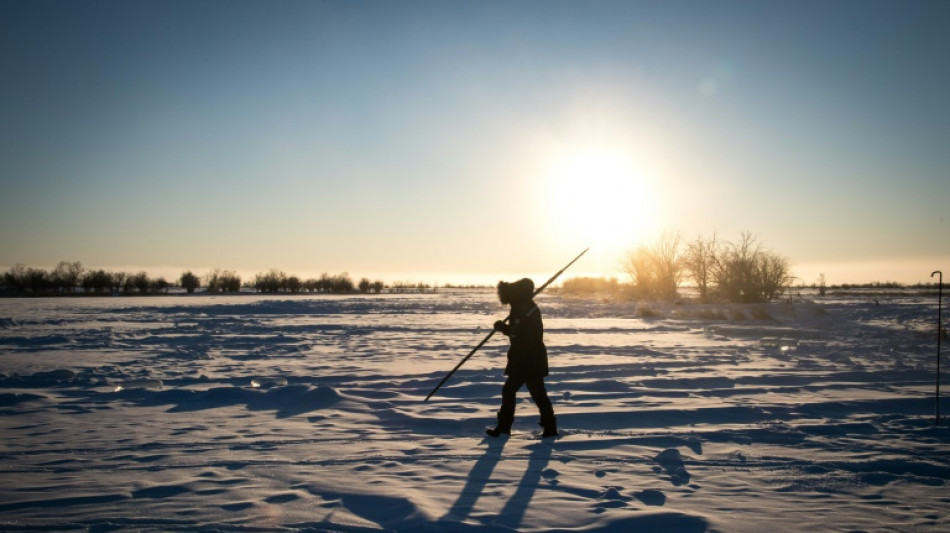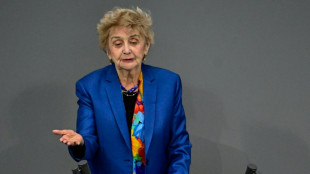
-
 Rockets veteran Adams out for rest of NBA season
Rockets veteran Adams out for rest of NBA season
-
Holders PSG happy to take 'long route' via Champions League play-offs

-
 French Senate adopts bill to return colonial-era art
French Senate adopts bill to return colonial-era art
-
Allrounder Molineux named Australian women's cricket captain

-
 Sabalenka faces Svitolina roadblock in Melbourne final quest
Sabalenka faces Svitolina roadblock in Melbourne final quest
-
Barcelona rout Copenhagen to reach Champions League last 16

-
 Liverpool, Man City and Barcelona ease into Champions League last 16
Liverpool, Man City and Barcelona ease into Champions League last 16
-
Tesla profits tumble on lower EV sales, AI spending surge

-
 Real Madrid face Champions League play-off after Benfica loss
Real Madrid face Champions League play-off after Benfica loss
-
LA mayor urges US to reassure visiting World Cup fans

-
 Madrid condemned to Champions League play-off after Benfica loss
Madrid condemned to Champions League play-off after Benfica loss
-
Meta shares jump on strong earnings report

-
 Haaland ends barren run as Man City reach Champions League last 16
Haaland ends barren run as Man City reach Champions League last 16
-
PSG and Newcastle drop into Champions League play-offs after stalemate

-
 Salah ends drought as Liverpool hit Qarabag for six to reach Champions League last 16
Salah ends drought as Liverpool hit Qarabag for six to reach Champions League last 16
-
Barca rout Copenhagen to reach Champions League last 16

-
 Arsenal complete Champions League clean sweep for top spot
Arsenal complete Champions League clean sweep for top spot
-
Kolo Muani and Solanke send Spurs into Champions League last 16

-
 Bayern inflict Kane-ful Champions League defeat on PSV
Bayern inflict Kane-ful Champions League defeat on PSV
-
Pedro double fires Chelsea into Champions League last 16, dumps out Napoli

-
 US stocks move sideways, shruggging off low-key Fed meeting
US stocks move sideways, shruggging off low-key Fed meeting
-
US capital Washington under fire after massive sewage leak

-
 Anti-immigration protesters force climbdown in Sundance documentary
Anti-immigration protesters force climbdown in Sundance documentary
-
US ambassador says no ICE patrols at Winter Olympics

-
 Norway's Kristoffersen wins Schladming slalom
Norway's Kristoffersen wins Schladming slalom
-
Springsteen releases fiery ode to Minneapolis shooting victims

-
 Brady latest to blast Belichick Hall of Fame snub
Brady latest to blast Belichick Hall of Fame snub
-
Trump battles Minneapolis shooting fallout as agents put on leave

-
 SpaceX eyes IPO timed to planet alignment and Musk birthday: report
SpaceX eyes IPO timed to planet alignment and Musk birthday: report
-
White House, Slovakia deny report on Trump's mental state

-
 Iran vows to resist any US attack, insists ready for nuclear deal
Iran vows to resist any US attack, insists ready for nuclear deal
-
Colombia leader offers talks to end trade war with Ecuador

-
 Former Masters champ Reed returning to PGA Tour from LIV
Former Masters champ Reed returning to PGA Tour from LIV
-
US Fed holds interest rates steady, defying Trump pressure

-
 Norway's McGrath tops first leg of Schladming slalom
Norway's McGrath tops first leg of Schladming slalom
-
Iraq PM candidate Maliki denounces Trump's 'blatant' interference

-
 Neil Young gifts music to Greenland residents for stress relief
Neil Young gifts music to Greenland residents for stress relief
-
Rubio upbeat on Venezuela cooperation but wields stick

-
 'No. 1 fan': Rapper Minaj backs Trump
'No. 1 fan': Rapper Minaj backs Trump
-
Fear in Sicilian town as vast landslide risks widening

-
 'Forced disappearance' probe opened against Colombian cycling star Herrera
'Forced disappearance' probe opened against Colombian cycling star Herrera
-
Seifert, Santner give New Zealand consolation T20 win over India

-
 King Charles III warns world 'going backwards' in climate fight
King Charles III warns world 'going backwards' in climate fight
-
Minneapolis activists track Trump's immigration enforcers

-
 Court orders Dutch to protect Caribbean island from climate change
Court orders Dutch to protect Caribbean island from climate change
-
Sterling agrees Chelsea exit after troubled spell

-
 Rules-based trade with US is 'over': Canada central bank head
Rules-based trade with US is 'over': Canada central bank head
-
Lucas Paqueta signs for Flamengo in record South American deal

-
 Holocaust survivor urges German MPs to tackle resurgent antisemitism
Holocaust survivor urges German MPs to tackle resurgent antisemitism
-
'Extraordinary' trove of ancient species found in China quarry


Sink to source: Arctic tundra emitting more carbon than it absorbs
After locking carbon dioxide in its frozen soil for millennia, the Arctic tundra is undergoing a dramatic transformation, driven by frequent wildfires that are turning it into a net source of carbon dioxide emissions, a US agency said Tuesday.
This stark shift is detailed in the National Oceanic and Atmospheric Administration's 2024 Arctic Report Card, which revealed that annual surface air temperatures in the Arctic this year were the second-warmest on record since 1900.
"Our observations now show that the Arctic tundra, which is experiencing warming and increased wildfire, is now emitting more carbon than it stores, which will worsen climate change impacts," said NOAA Administrator Rick Spinrad.
"What happens in the Arctic doesn't stay in the Arctic," Anna Virkkala of the Woodwell Climate Research Center, who co-authored the report, added to AFP. "We should try to stop anthropogenic climate change as soon as possible, so that we can also stop the emissions from the Arctic eventually as well."
The finding is based on an average of observations recorded from 2001-2020.
Climate warming exerts dual effects on the Arctic. While it stimulates plant productivity and growth, which removes carbon dioxide from the atmosphere, it also leads to increased surface air temperatures that cause permafrost to thaw.
Thawing permafrost releases carbon previously trapped in frozen soil as carbon dioxide and methane -- two potent greenhouse gases -- through microbial decomposition.
In 2024, Alaska recorded its second-warmest permafrost temperatures on record, the report said.
Human-caused climate change is also intensifying high-latitude wildfires, which have increased in burned area, intensity, and associated carbon emissions.
Wildfires not only combust vegetation and soil organic matter, releasing carbon into the atmosphere, but they also strip away insulating soil layers, accelerating long-term permafrost thaw and its associated carbon emissions.
Since 2003, circumpolar wildfire emissions have averaged 207 million tons of carbon annually, according to NOAA. At the same time, Arctic terrestrial ecosystems have remained a consistent source of methane.
"Last year, 2023, was the largest fire year on record due to Canadian wildfires, which burned more than twice any other year on record in Canada," report co-author Brendan Rogers said during a press conference.
The fires emitted nearly 400 million tons of carbon -- more than two-and-a-half times the emissions from all other sectors in Canada combined, he added.
Meanwhile, 2024 ranked as the second-highest year for wildfire emissions within the Arctic Circle.
- 'Alarming harbinger' -
Asked whether the Arctic's shift from carbon sink to source might be permanent, Rogers said it remains an open question. While boreal forests further south still serve as carbon sinks, northern regions are of greater concern.
"The best as we can tell, permafrost emissions are not going to dwarf fossil fuel emissions, but they are a significant layer, and so they need to be accounted for," he told AFP, adding that aggressively limiting human-caused warming would stem the problem to some extent.
Reacting to the news, Brenda Ekwurzel, a climate scientist at the Union of Concerned Scientists said that "the climate catastrophe we're seeing in the Arctic is already bringing consequences for communities around the world."
"The alarming harbinger of a net carbon source being unleashed sooner rather than later doesn't bode well. Once reached, many of these thresholds of adverse impacts on ecosystems cannot be reversed."
Warmer temperatures are impacting wildlife too, with the report finding tundra caribou numbers have decreased by 65 percent over the past two to three decades -- with summer heat disrupting their movements and survival, alongside changes to winter snow and ice conditions.
Surprisingly, however, Alaska's ice seal populations remain healthy.
The report found no long-term negative impacts on body condition, age of maturity, pregnancy rates, or pup survival for the four species of ice seals -- ringed, bearded, spotted, and ribbon -- inhabiting the Bering, Chukchi, and Beaufort seas.
F.Mueller--VB

